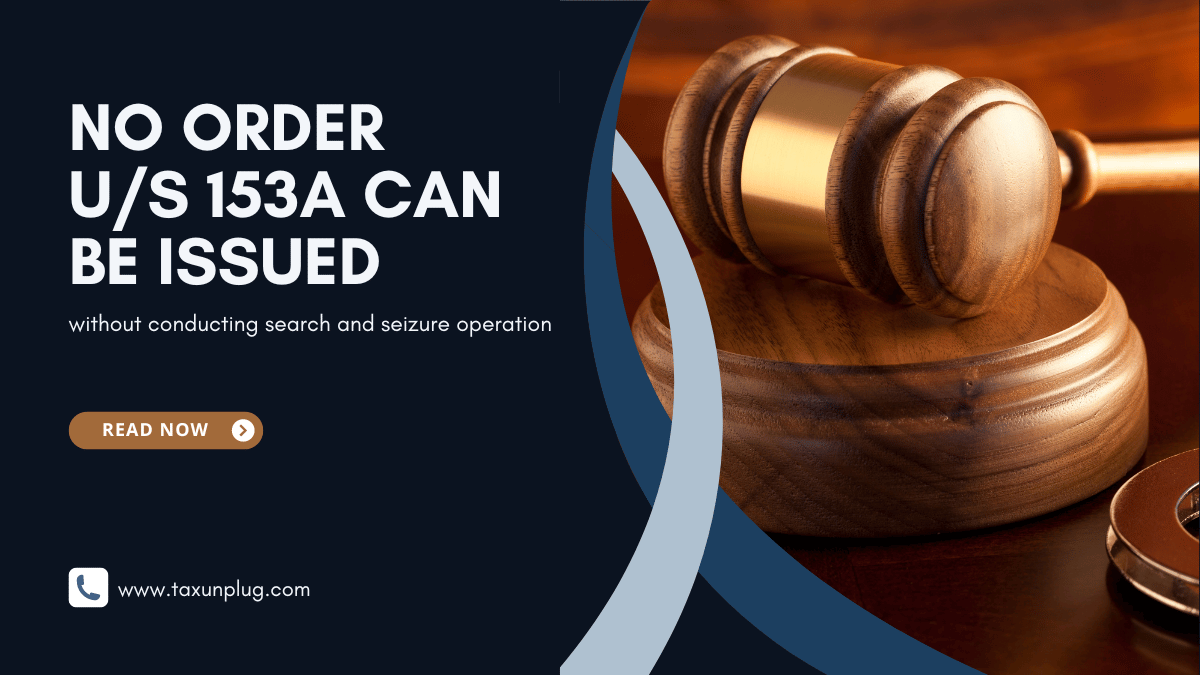No Order u/s 153A can be issued without conducting search and seizure operation
Misty Meadows Pvt Ltd v. Union of India [CWP No. 5139 of 2024] (Punjab and Haryana High Court)
A search and seizure operation was conducted against XYZ company at its office, which was its registered office and business premises. However, while preparing panchnama drawn at the registered office, name of the petitioner company was also added, although it is asserted that no authorization for search and seizure under Section 132 of the Act was issued in the name of the petitioner nor any search or seizure was conducted at the premises or registered office of the petitioner company.
In the panchnama dated 24.07.2016 and 19.09.2016, which was prepared for search, the name of the petitioner company was mentioned and it was alleged by revenue that there were incriminating documents found during the search and also in an independent search of an Ex-Vice President of the company who had resigned and disassociated from the company on 12.11.2014, where certain details were found relating to the petitioner on cloning of his laptop. On the said basis a notice under Section 153A of the Act was issued for AY 2011-12 on 05.01.2018
Aggrieved by this, the petitioner raised objections relating to issuance of notice to it under Section 153A of the Act. The petitioner thereafter also moved settlement application before Interim Board for Settlement but it rejected the application on 29.03.2023 under Section 245D(4) of the Act.
The petitioner company submitted its response on 24.01.2024, 29.01.2024 and 30.01.2024 raising objections regarding the proceedings initiated under Section 153A of the Act to be without jurisdiction and without authority in law. The petitioner had been served with a show cause notice dated 30.01.2024 for addition of income of INR 400/- crores for AY 2011-12 as payment made to entities from undisclosed sources and an order has been passed on 07.02.2024 concluding assessment proceedings under Section 153A r.w.s. 153D of the Act.
The petitioner had challenged the panchnama where its name had been entered and submitted that it had already suffered search and seizure earlier resulting in an order passed under Section 153A of the Act and, therefore, proceedings again initiated under Section 153A were wholly unwarranted. The exercise of power under Section 153A based on panchnama was not available.
Learned counsel for the petitioner submitted that the procedure laid down under Section 153C of the Act was untouchable and submitted that if a particular procedure has been laid down under the statute, revenue officials were obliged to conduct themselves accordingly and a different procedure could not be adopted. They further submitted that the order of imposing INR 400/- crores by issuing a fresh assessment order under Section 153A of the Act was based on complete non application of mind. They submitted that there was no flow of proceeds of such money traceable to the books of accounts of the petitioner and the addition stands already made on protective basis in the books of accounts of other company. The amount received was only INR 10 crores and the remaining amount of INR 396 crores was received and assessed separately for the other companies. However, the revenue had put the entire additions on the petitioner company as undisclosed income.
The Hon’ble High Court held that the panchnama would be a document which has to be prepared recording articles, material and objects which may be seized as incriminating documents at the time of conducting search of premises. Mentioning of the name of any company in the panchnama would only reflect that documents relating to that company were found during the search at the premises. A panchnama, therefore, cannot be treated to mean authorization issued to the authorities under Section 132 of the Act.
It concluded that the name being mentioned in the panchnama alone cannot be a conclusion that there was authorisation to conduct search against the petitioner under Section 132 of the Act.
The Court also found that the revenue had invoked and initiated proceedings under Section 153A of the Act, although neither there was any search initiated under Section 132 of the Act as against the petitioner; nor it could be said that the search was conducted at its premises. Thus, the proceedings initiated under Section 153A were found to be vitiated.
Once the search and seizure was conducted and an assessment order was passed by invoking Section 153A of the Act for the AY 2006-07 to 2012-13, fresh order without conducting search and seizure operation would not be sustainable in law.
Accordingly, the writ petition was allowed and the notice, assessment order and demand notice were quashed and set aside, and the proceedings were held to be non est.
To download the official order, click here.
“The site is for information purposes only and does not provide legal advice of any sort. Viewing this site, receipt of information contained on this site, or the transmission of information from or to this site does not constitute an attorney-client relationship.
The information on this site is not intended to be a substitute for professional advice.”

